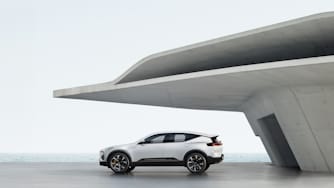Polestar 0 project: a directed call for collaboration on the elimination of greenhouse gases
Sturdy constructions are built from the ground up. The same goes for sustainable products. Creating a truly climate-neutral car means we first need a sustainable foundation. But laying a solid, and sustainable base is no solo mission. It requires teamwork. Which is why we’re looking for further collaboration in the Polestar 0 project.

We need to build new sustainable solutions from ground up, starting with securing sustainable sources to build high-end materials.
To succeed in creating a fully climate-neutral car by 2030, we need to completely rethink the way cars are made, starting by securing the abovementioned sustainable base. To do so, we need to explore new technologies within the fields of minerals, bio-based chemicals and polymers, electronic components, noble gases, and other base materials. That is why we are issuing a directed call for collaboration, looking to find partners who deal with the most elementary building blocks of material development, for the Polestar 0 project. This includes those involved in mining, bio-based materials, high-end man-made materials. Today, everything from extracting raw material to producing man-made superior materials follows processes that have been refined over centuries, to serve the requirements of modern products. However, many of these processes are dependent on crude oil, natural gas, and coal, with greenhouse gas emissions as a result. Only by scrutinising the traditional ways of material development can we find new solutions that are completely without greenhouse gas emissions. And in this way, lay the groundwork upon which to build products of the future upon. “There are things that can be fixed, and there are things that cannot. Not without a complete overhaul, in any case. The issue of decarbonisation is one of the latter,” states Head of Polestar 0 project Hans Pehrson. “We need to build new sustainable solutions from ground up, starting with securing sustainable sources to build high-end materials. Now is the time to move away from our dependency on fossil sources towards solutions without greenhouse gas emissions.” Companies, researchers, and investors that operate in this field and that share this vision are all welcomed to join the development towards a more sustainable future. To submit your interest in collaborating, click here. The submissions portal is open from September 14th until October 14th.Since the first open call in February, several industry leaders have joined the Polestar 0 project. At the forefront of their respective fields, the new and existing partners will work with the dedicated Polestar 0 task force on finding innovative solutions to decarbonise the entire supply chain and manufacturing process of Polestar 0. The announced partners, Autoliv, Boliden, Bulten, Hexpol, Hydro, Ovako, Papershell, Pensana, Plasman, Sekab, SSAB, YFPO, Mistra Carbon Exit, Stilride, GG Groupand ZF, together cover important areas in the building blocks of a climate neutral car.“I’m overwhelmed by the positive response and the dialogues we’ve had with companies, universities, and other partners since the last open call, despite the severity of our common challenges,” Pehrson comments. “By continuing to focus on the base materials, and with hopefully even more partners within this field, I’m certain we will get a sturdy foundation in place.”“If enough of us believe, I’m convinced it can be done,” he concludes. To create something that has never been done before, we must rethink everything. Break with the traditional ways of making cars. Start anew. We need to lay the groundwork and create a new sustainable foundation to build the products of the future upon. Set a new, climate-neutral standard. For this car and beyond.


